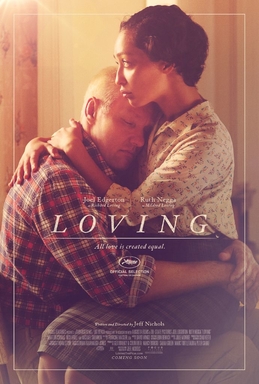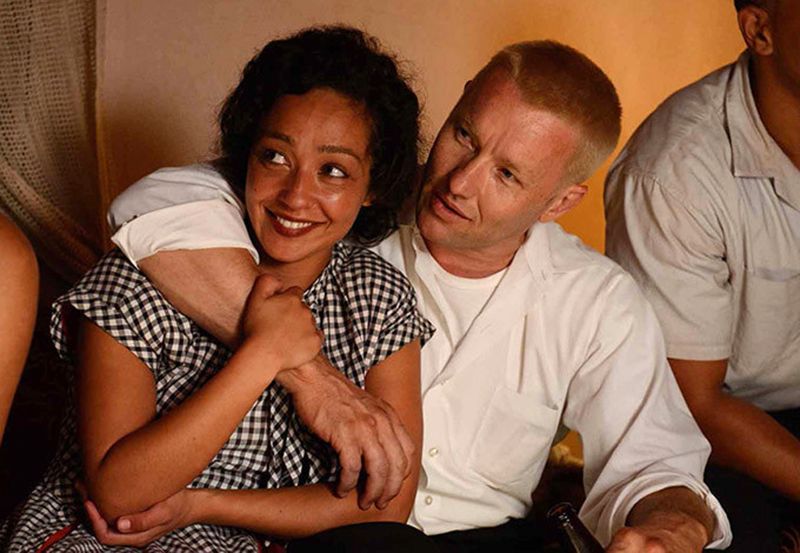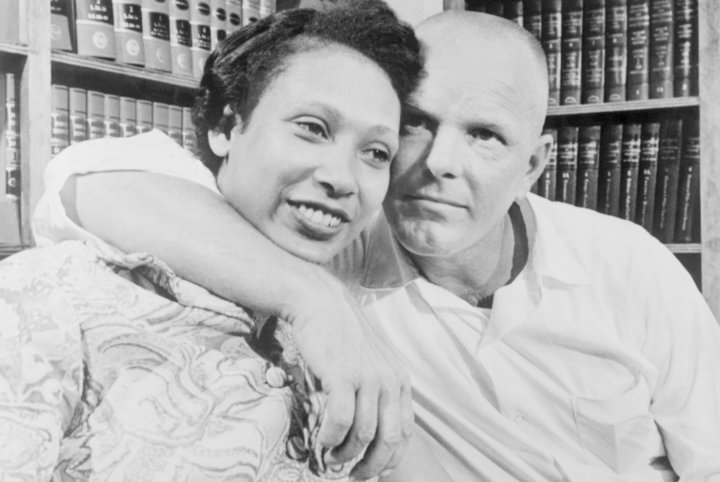Loving on the Inside
Happy Loving Day! This will probably be a few days late by the time you read this, but this year marks the 50th anniversary of a great day in history.
In honor of Loving Day, I watched Loving, the 2016 movie based on the lives of the Lovings.
So, the story begins in the 1950s, when a man named Richard (Joel Edgerton) fell madly in love with a beautiful young woman named Mildred (Ruth Negga), whom he affectionately called “Bean.” Their love turned into passion, and they ended up conceiving a child (get ready to clutch the pearls!) before they were married. Richard then purchased a plot of land to build a home for the lovebirds and their child-to-be. He also wanted to make an honest woman of Mildred and express his love and dedication to her in the best way he knew: proposing. And of course, like all great love stories, Mildred said yes! An awesome love story, right? I wish I could say “…and they lived happily ever after. The end.” But, I cannot. The love story of Richard and Mildred Loving is much more complicated than any fairytale you’ve probably ever read, mainly because, well . . . theirs is a true story.

So what made their relationship so complicated? I hate to even type this because it feels so dirty and wrong to say, but Richard was White and Mildred was Black. Well, she was of color, although she wasn’t completely Black. But, if you know about the One Drop Rule, you’ll understand why she has been labeled as Black. During the 1950s (and for years and years prior), it was not only taboo to date outside of your race, it was against the law. Instead of coming home to live in perfect harmony, Richard and Mildred were put in jail for their marriage.
The couple lived in Virginia, where interracial marriages were definitely illegal, so they traveled to Washington D.C. to get married (where the marriage would be more “acceptable”). When they returned to Virginia to begin their married life, someone ratted them out and they were arrested. Clearly the tattletale didn’t know the concept of “snitches get stitches,” and ran the risk of being f-ed up. Unfortunately, Mildred and Richard never found out who spilled the beans to 5-0. They were both let out on bail, and were going to be imprisoned for at least a year, but they hired a great (well, great-ish) lawyer to get them off the hook for jail time—only they had to either dissolve the marriage, or move out of the state. On top of that, the two of them couldn’t even be in the state of Virginia at the same time FOR THE NEXT 25 YEARS! Crazy, right?

Don’t forget: Mildred was still pregnant at this time. So they moved to D.C., but Mildred was very upset. Oh my gosh, I fell in love with Joel Edgerton, who played Richard, when he pulled himself close to Mildred in bed and asked her, “What can I do to make this better?” or something to that effect, and I was like “OMG, can you be any hotter?” Richard’s mom was a midwife type of woman who delivered babies, and Mildred was like, “I just thought your mom would deliver the baby…” so Richard was like, “Okay.” And he made it happen. All he wanted to do was make Mildred happy, and he would clearly move heaven and earth to give her anything she wanted. They risked imprisonment to go back home, but it was an example of sincere, pure love. Yes, you can cry now.
When I began watching the movie, I was thinking, This man is willing to defy a whole government system for the love of his life, and I can’t even get a text back. :-/ But I digress…
After their baby was born, the two end up getting caught AGAIN (good grief!) and getting arrested. They went right to court and their lawyer rushed in, claiming he told them it was all right to come back for the birth (lies!), but the judge granted them leniency and they had to leave the state again.
Fast forward, and they had two more beautiful mixed babies and a good life. But, one awful day, one of their sons was hit by a car. He survived, but Mildred was rattled. She no longer wanted to raise their children in D.C. and said that she didn’t care what they’d do to them, she was going back to Virginia to raise her kids. With some help, they ended up getting a house in a secluded area and began to appeal the order against them. They got two lawyers to go before THE FREAKING SUPREME COURT to overturn the ruling. There was a bunch of publicity and press surrounding the case, and Mildred hoped their story and struggle could help someone else IF they won.
***Spoiler Alert***
They won! It became unconstitutional for there to be a ban on interracial marriages. The ban was lifted for Virginia and all other states that still had the ban in place. This didn’t happen until 1967. For almost ten years, they were fighting.
Side note: I adore how spot on and self-explanatory their last name is for their feelings for each other, and that it’s in verb form! Love is an action word!
Sadly, just seven years later, Richard died in a car crash. It broke my heart, because I knew about the story and the case Loving v. Virginia, but I did not realize they had so little time to live in “harmony” together. Mildred lived until 2008, and never remarried. Richard was truly the love of her life.

Have you ever been in love? Like truly, madly, deeply in love? Loved someone so much that your souls intertwined? That your first thought of the day was their smile, and your last thought their kiss? Have you loved someone so much that you felt your life didn’t begin until they walked in and seemed to give you meaning? You’d gift them your kidney just because they asked? I’m sure you’re thinking about them now. Did it matter what shade of brown their skin was? At some point, you no longer saw their outer shell and only saw their heart and soul. So I couldn’t even imagine the epidermis layer of a person’s body being a deterrent or hindrance from true love. I remember being in love with a guy so much, at some point I forgot he was even attractive, because his outside was just a bonus. Then I looked at him one day and was like, “DAAAAAANNNNNNGGGGGG BBOOOOOYYYYYYY!!! You are HOT!” I totally forgot about it. His heart was what I found to be so handsome.
So, why does this whole thing even matter to me? Especially enough to write about? Well, this is so close to my story. My parents got married in 1978—just eleven years after the anti-miscegenation laws were overturned. And yes, I live in California so it was already “allowed” for interracial couples to wed, but it has a direct correlation. Just to think, it had only been a matter of years since their union had become “acceptable.” But still, many people in my parents’ lives were not supportive. My mom is Pentecostal, my dad is Catholic, my mom is Black, and my dad is Italian. Well, those are the main distinctions that made their relationship in others’ eyes more… complicated. Many family members and friends on both sides didn’t attend the wedding. My dad’s aunt said she would write my dad out of her will if he married my mom. My mom’s adopted dad/godfather told her my dad was just looking for “Black nookie” and it was a phase.
One of the lawyers for the Loving v. Virginia appeal said the defense would use the argument that “it is unfair to have biracial children. In the eyes of the law, they are bastard children.” And yes, once again, it’s okay to cry. I did, both when I heard it watching the movie and now again as I write it. My aunt and god/grandfather are old now, but still living, and I have to live knowing that, at one point, they thought my parents getting married and having me would be a “mistake.” Luckily, I’m not petty. 🙂
If you ask me, being a mixed child is totally fair. My parents were in love, were married, built a home and a family, I had a stable upbringing, I knew who my dad was—I think I had a very normal life overall. But this is a real thought. I don’t think I really “struggled” as a biracial child, but I know there are so many people out there who have struggled with identity crises because of not really “belonging,” and this movie kind of exemplified why. I think every household or family will have obstacles, and what’s unfair is blaming it on mixing races. It’s like when you have to blame someone or something, so the easiest thing to notice is the differences in skin color. For shame. It sucks knowing we’re still living within the lifetime of many people who lived during segregation, and who were also in favor of it.
I will admit, sometimes I feel like a spectacle. I’m the unicorn of races. People are amazed that my parents are different ethnicities and try to study my characteristics and appearance and figure out what behavior comes from what racial background. And I get it, I look different. I’m peculiar. But, if getting to know me gives people a better understanding of how beautiful love without boundaries can be, I’m here for it. Exam me! Ask to see pictures of my Black mama and White daddy! Ask me about their love story! Let me help normalize long-term interracial marriages and relationships, and take away fetishized perceptions of dating outside of a person’s race!
This movie makes me think of every story I’ve heard from my parents and others who have suffered for the sake of love. It’s such a far off and distant idea (not to mention unrealistic) to think that at one point, people of different races or ethnicities couldn’t be married.
My parents will celebrate thirty-nine years of marriage in August. My mom told me that when my dad asked her to marry him, she said, “You know I’m Black, right?” HA!!! My dad said he knew, and the rest is history.

